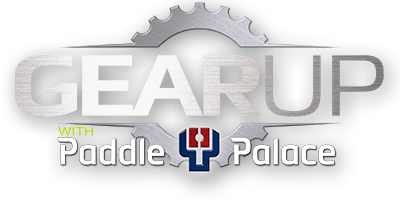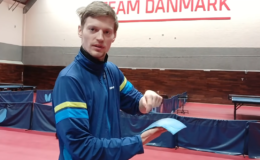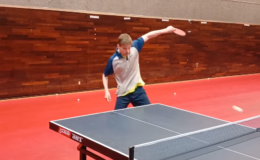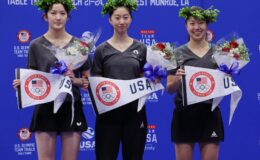
REVIEW BY MICHAEL LANDERS | Buy Ping Pong for Fighters Here |
A Conversation with Paralympic Gold Medalist Tahl Leibovitz on his latest book, “Ping Pong for Fighters”
Michael: Thanks for taking the time to talk. I know you’ve been extremely busy with clinical work and finishing your Masters Degree in Social Work at NYU.
Tahl: You’re the one doing me a favor, so thank you. Actually before we start I have a question for you. Recently at the Westchester Tournament you had wins against a 2684 player and a 2764 rated player. How do you do that with no practice?
Michael: Ha-ha, I did play once a week while I was studying abroad in Europe, so that helped. I just fought hard and I tried to stay positive throughout the match. Actually, your book helped me quite a bit. It’s funny because I read it for the first time a few days before the tournament!
Tahl: Thanks, I am sure it was my book that made you win all those matches! I guess now that we are on the subject of the book, I hope you enjoyed it. If you had to use one word to describe the book, what would it be?
Michael: Definitely “Mental.”
Tahl: Mental?
Michael: I would consider the book more of a mental approach to table tennis. I really enjoyed how you tied in a large amount of personal anecdotes into it.
Tahl: I don’t know if I would really consider it a book about the mental game. There is a bunch of other stuff in there but I would consider it maybe 60% mental. For me, my biggest struggle has been getting stuck on outcome-based table tennis. I go into a match expecting a certain result or a certain series of points to take place. When that doesn’t occur, it becomes frustrating. So I think part of table tennis is being able to manage expectations during the match as well as being able to focus all your energy in the moment rather than the future.
Michael: Ok, I understand. I have known you and watched you play matches for many years. It seems to me that you are a fighter in more ways than in just table tennis. Is that why you decided to name the book “Ping Pong for Fighters?”
Tahl: I was planning on calling the book, “Philosophy of Table Tennis” or “Sociology of Table Tennis” or something along those lines. The editor Ken Lim had some kind of boxing book with him that he really liked. I think it was about cage fighting or something. From that book he came up with the name “Ping Pong for Fighters.” I thought it was a pretty cool name.
Michael: Ok, talk to me more about the book. What can the reader get from the book that they might not get from another table tennis book? There are quite a few books out there.
Tahl: There are many very good books in table tennis. I can’t speak for other books but I can say that the goal of this book is to help the reader find the best approach to succeeding in the sport. The book is broken down into four sections: the self, the opponent, the ball and the environment. The book is not very technical. I had about 10 years worth of table tennis notes and experiences and made them very concise. There is also a lot more included than that. There is the whole mental component and advice from top table tennis players who I have spoken to over the years such as Waldner, Schalger, Karlsson and so on. There are stories in the book about table tennis trips that went bad.
Michael: I don’t want to give a way too much from the book, but the ending is very powerful. You really move away from table tennis in the final chapter to more of a personal experience you share with a United States Table Tennis coach while in another country. Was there a reason for that?
Tahl: The reader of this interview is probably not going to get too much of an idea of what you are talking about but, I think it ties into to what Peter Karlsson said in the book about table tennis not being bigger than life. Without going into too much detail, the final chapter leaves an opening for another book, which I have sort of been working on. But I am not sure I will release another book. I am really happy with the way this book came out. I don’t feel the need to release another one. If another one does come out, it will be more of a biography.
Again, I probably did not answer your question so I will say that the reason for the epilogue is because I wanted the reader to understand that the process is more important than the outcome and the conversation I was having with what that coach was experiencing at the time was a lot bigger than the sport of table tennis. That was something the coach them self would have to overcome. There was nothing I could do accept to be understanding and supportive. So again, there are things in life that are bigger than table tennis. It is important to know that as a table tennis player. It will probably allow you to play better.
Michael: A biography would make a great addition to this book. Now, I saw that Stellan Bengtsson wrote the foreword for this book. Can you talk to me a little bit about that?
Tahl: Yeah that is correct. I was walking in Washington Square Park about six months ago. I got a call from Stellan Bengtsson. I picked up the phone and was wondering why he was calling. Its not every day that I get a phone call from a world champion. Then I remembered I had sent him a copy of the book. I asked him if he could read it and check if there were any mistakes in the book. I was mainly looking for tactical mistakes or things that didn’t make sense. In the first sentence of the book I wrote, “Some people think table tennis is a tough sport but, it’s really not that tough”. So, the first thing Stellan said to me was “Table Tennis is a very difficult sport, it’s not that easy.” I started thinking, “Wow, I am in deep trouble. That is only the first sentence.” (Of course I changed the sentence around!)
Michael: What happened next?
Tahl: He started talking to me about the sport and gave me a few suggestions on the book. I wrote everything down. Then I asked him what he thought about the book and what he said next pretty much surprised me.
Michael: This is getting interesting.
Tahl: He said the book was awesome. He said he loved it. Then he said that he would write the foreword for the book. That pretty much made my week, maybe even my year. I couldn’t ask for more than that.
Michael: That is definitely awesome. Was there anyone else that helped you with the book?
Tahl: First and foremost I have to say that Sean O’Neill did so much work for the book. Sean was one of the editors of the book and the process of getting it into an actual hard copy took weeks. I think Sean spend close to 100 hours total helping with the book. Ken Lim also did a huge job with the editing. Ken was the main editor. I did get help from Kyle Angles as an editor as well. Kyle was outstanding. Larry Hodges was immensely helpful. I asked Larry tons of questions and he was able to answer them all rather quickly. Emmanuel Shiu designed the cover of the book.
Michael: Don’t I know Emmanuel Shiu from somewhere?
Tahl: He is my teammate. He was on the USA Para Pan Am team. He is also a world renowned artist and designer. He worked on tons of movies. http://www.eshiu.com/
That’s his website. He worked on the movie Spiderman. He helped create the stadium in the Samsung World Cup commercials. He does concept art. He is amazing.
Michael: So I guess the cover came out pretty good.
Tahl: “Good” is an understatement. The cover is rated 2850 and might well be under rated. When I first got the book and saw the cover, I thought, “This is awesome”. The book looks great and it feels great.
Michael: What was the biggest challenge for you in writing the book.
Tahl: Finding the time was tough. Between coaching, training, going to school full time and trying to accumulate 1200 clinical hours in order to take the LMSW exam, it was tough.
Michael: Oh yeah, talk to me a little bit about your current school situation.
Tahl: First, I will say that the proceeds from this book are helping me with my college and daily expenses. I am currently attending New York University and am completing a Master of Social Work and am in my final year. Also, that means that we will get to play on the same team for the Collegiate Nationals, which should be an incredible experience. We have a great group of players this year on the team, so we should have some very interesting matches.
Michael: Yep, I completely agree. OK, is there anything else you want to say before we end this interview?
Tahl: I think you pretty much covered it. I hope everyone enjoys the book. It is for sure worth the value and I was very impressed with how the physical copy came out. I had an awesome time writing it and it has been selling quite well. I almost forgot, here is the direct link to get the book: www.paddlepalace.com
Michael: Awesome, Tahl. Thank you so much for your time! I can truly say that your book has helped me in more ways than one and getting to know you and watch you compete over the last 10 years has been a complete inspiration to me and many others!




